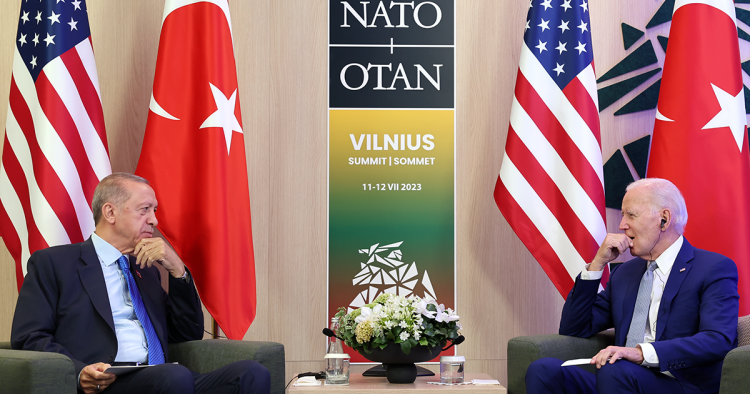This article is part of a longer report from MEI's Turkey Program on Turkey in the aftermath of the March 2024 local elections, What Comes Next for Turkey? Prospects for Change on the Political, Economic, and Foreign Policy Fronts.
Introduction
The dynamics of power in the international arena have undergone significant shifts since the early 2000s, resulting in an asymmetric multipolarity characterized by ever-changing capabilities among regional powers. Consequently, the delineation between war and peace has become increasingly nebulous, while deregulation stands as a fundamental force in international relations. For emerging middle powers like Turkey, this evolving landscape has simultaneously expanded and constricted their maneuverability.1
Against this backdrop, Turkey's approach to alliances has also evolved. While maintaining its long-standing membership in the Western alliance, Turkey has increasingly sought to assert its autonomy, testing the limits of this alliance. Particularly following the Arab uprisings of 2010-11, Turkey shifted from a politics of strict alliance adherence toward a more autonomous foreign policy posture. Yet this posture has faced major challenges. Unlike many other middle powers, Turkey remained deeply embedded within Western institutions and norms as a member of the North Atlantic Treaty Organization (NATO). Yet Turkey aspired to transcend its status as a medium-sized power and assert itself as a regional influencer.2
This ambition manifested itself through increased military interventions abroad, attempts to shape regional conflicts via transnational ties, and efforts to leverage soft power to expand its influence. While enhancing the ruling Justice and Development Party's (AKP) domestic authority and enabling autocratization, these efforts complicated the maintenance of Turkey’s alliances.3 Political elites increasingly perceived the emergence of a post-Western world order, fostering a desire for greater independence from the West.4 A number of changes, including a growing regionalization of the Kurdish issue; the alliance in Syria between the Democratic Union Party (PYD), the People’s Protection Units (YPG), and the US; the 2016 coup attempt and resulting deepening of security concerns emanating from the West; and a gradual transition in foreign policy focus toward the Muslim world, all contributed to a perception that Turkey is shifting its foreign policy axis rather than employing either autonomy or balancing.
In recent years, however, Turkey's foreign policy has once again undergone a significant transformation, driven by several factors. Firstly, the economic crisis that intensified around 2022 led Ankara to prioritize its efforts to seek both foreign financing and investment. This had its sharpest and most pronounced impact on foreign policy. Secondly, Russia’s February 2022 invasion of Ukraine led to increased cohesion among the Western alliance and a recoding of Russia as one of the main threats to the global system for the West.5 More importantly, the war in Ukraine has weakened the tools that enabled Turkey to balance the Western alliance through its relationship with Russia. This highly destructive war, which is taking place on its doorstep, increased Turkey's need for NATO's capabilities to ensure Black Sea security. Finally, the emergence of an anti-Turkey bloc among regional actors including the United Arab Emirates, Saudi Arabia, Egypt, and Israel, coupled with broader normalization trends in the Middle East, compelled Ankara to recalibrate its aspirations for regional hegemony.
Indeed, the AKP's pursuit of hegemony in the Middle East between 2011 and 2021 ultimately resulted in a notable failure. The ideological framework of political Islam and support for the Muslim Brotherhood proved unsustainable, leading to its abandonment in the face of the emergence of formidable opposing blocs. In other words, similar to the normalization trends in domestic politics, the AKP government has also bolstered normalization in foreign policy, aiming for integration into regional and international blocs. The domestic economic and political crises further underscored this trend, and the results of the March 2024 local elections demonstrated to the government that its polarizing discourse no longer resonates either inside or outside the country. In what follows, this article will first review the changing domestic political dynamics of foreign policy, then focus on Turkey’s role in the Western alliance with a specific emphasis on the Ukrainian War, and finally, assess the Middle East normalization process in light of the Gaza conflict.
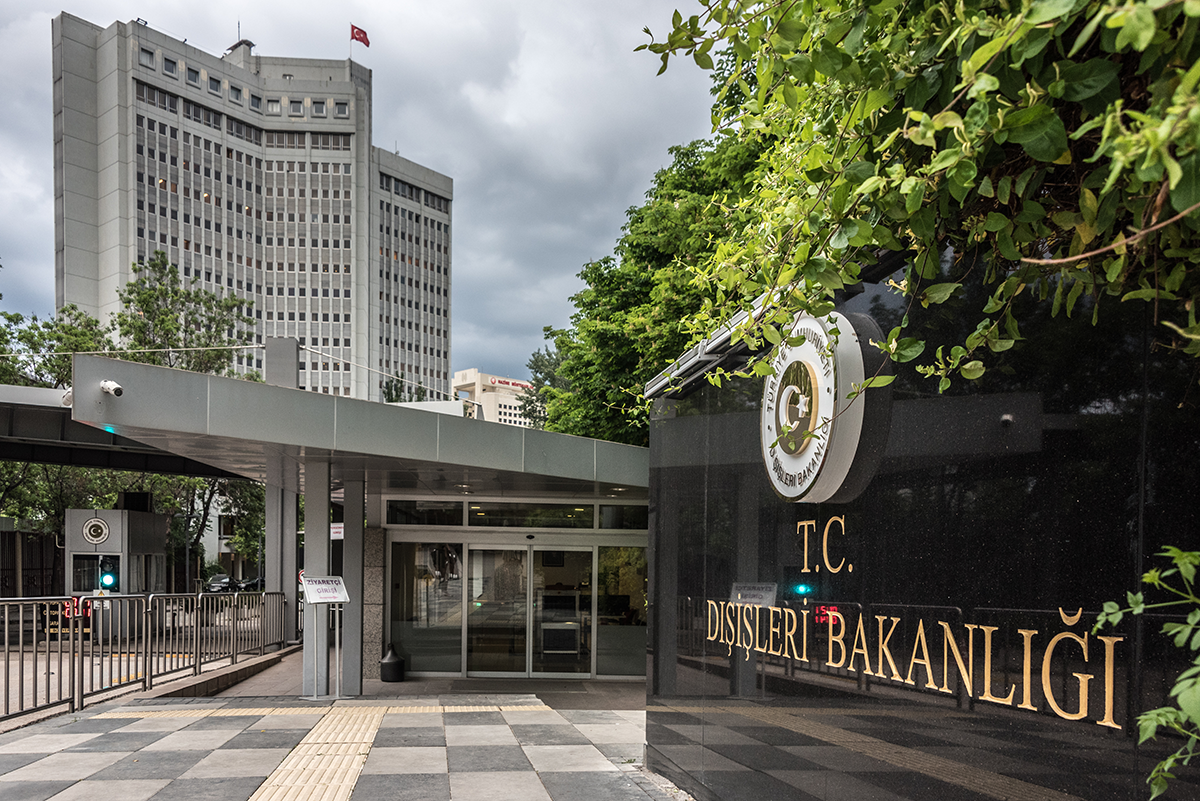
Domestic Politics and Foreign Policy
Identity politics and polarization along the conservative-secular divide have been the primary drivers of the AKP’s sustained electoral support, cementing its base within the Turkish electorate. However, it would be inaccurate to attribute the party's electoral success solely to identity politics and partisanship. The AKP has also adeptly utilized both formal and informal redistributive mechanisms to maintain its political dominance. Policies such as increases in the minimum wage and the provision of free healthcare services for the unemployed or low-income groups were expanded under the AKP, to consolidate voter support. The construction sector played a pivotal role as well, particularly during the AKP’s growth phase, with mega-projects and construction initiatives overseen by government allies generating significant rents and bolstering voter support.6
However, the party's economic success became unsustainable from 2020 onwards, disrupting its authoritarian bargain.7 The escalating fiscal deficit, combined with challenges like increasing unemployment and soaring inflation, heightened the conflicts of interest between voters and the AKP’s elite base. Specifically, low-income groups began to withdraw their support from the party due to the rising cost of living and economic instability. While the high cost of living posed a challenge for low-income groups, economic uncertainty presented a risk for entrepreneurs. By 2023, these factors had contributed to the party's difficulties in maintaining its "winning coalition."
Given these conditions, the government set two primary objectives for itself in 2023: firstly, to implement redistributive measures aimed at preserving voter support for the crucial May 2023 elections; and secondly, to tackle the international financing gap stemming from challenges to Turkey’s macroeconomic stability. Confronted with this dual mandate, the government prioritized addressing the costs of the electoral economy in the first half of 2023, followed by implementing macroeconomic stabilization policies in the latter half of the year. The substantial redistributive spending before the 2023 elections, however, strained the budget, diverting resources away from post-election economic stabilization efforts, and ultimately contributing to the AKP’s electoral loss in the March 2024 local elections.
Parallel to the domestic context, the economic crisis has significantly influenced the reshaping of foreign policy. While geopolitical factors and national (and regime) security considerations were the primary drivers of foreign policy in the past decade, the deepening economic crisis has elevated the importance of economic factors.8 Following the May 2023 elections, Ankara, with the newly appointed Finance Minister Mehmet Şimşek, initiated efforts to secure additional funds and foreign investment to address its economic challenges. In mid-July, President Recep Tayyip Erdoğan undertook an official visit to the Gulf states to seek economic support, signing a series of memoranda of understanding with leaders from Saudi Arabia, the UAE, and Qatar.9 These efforts were in line with the normalization process that began in the early months of 2022, starting with engagements with the UAE and subsequently with Saudi Arabia.
Yet European markets and investment are ultimately needed to ensure macroeconomic stabilization. Key economic sectors, like automobiles, textiles, and steel, which account for a substantial portion of Turkey's exports, rely heavily on the European market. As Onur İşçi and Samuel Hirst note, Turkey's economic dynamics are characterized by dependence on Russia for supplying energy, China for importing inexpensive goods, and Europe for selling the goods it manufactures.10 At the same time, Ankara's confrontational rhetoric toward Western capitals began to soften, with bilateral talks, especially with the US, accelerating. Perhaps one of the most significant indicators of this new approach was the resumption of the Turkish-Greek dialogue. Numerous high-level meetings between Turkey and Greece were held throughout 2023, during which both parties agreed to identify areas for bilateral and international agreements and cooperation. In December 2023, President Erdoğan and Greek Prime Minister Kyriakos Mitsotakis signed the "Athens Declaration on Friendly Relations and Good Neighborliness." In 2024, talks continued between Turkey and Greece, with energy and defense cooperation high on the agenda.
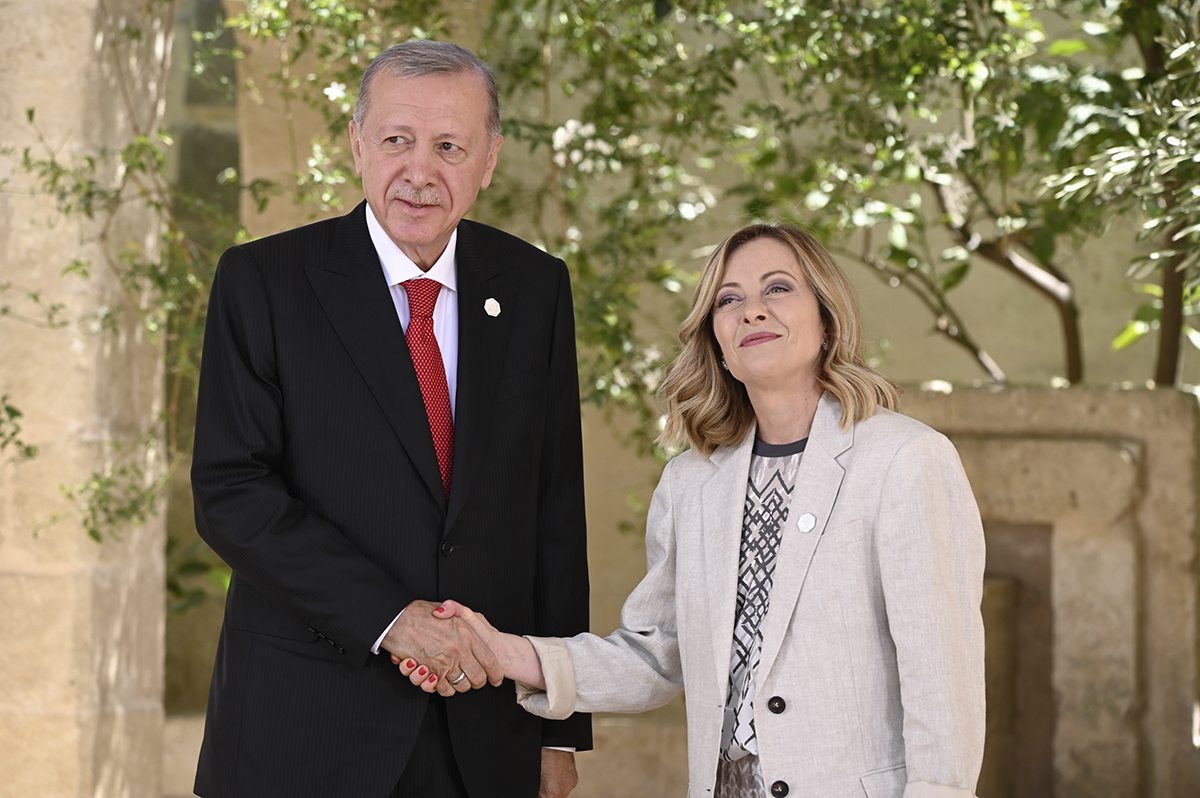
Turkey in the West
The economy was certainly not the sole driver of Turkey's détente with the West. The conflict in Ukraine had already reshaped Ankara’s relations with the Western alliance, fostering reconciliation. Yet these developments do not necessarily indicate that Turkey and the West are moving toward a renewed alliance; instead, enduring conflicts persist and trust issues remain unresolved. Realignment is mostly about the normalization of transactional relationships, which differs from past eras when reconciliation occurred on more substantive grounds. More importantly, the “normalization of transactionalism” occurred in the shadow of the AKP's triumph in the 2023 elections, which bolstered the sentiment in Western political circles that cooperation with Erdoğan was the most pragmatic option available.
Turkey and the EU
Turkey's relationship with the European Union suffered its most significant setback during this period as well. It was defined by transactionalism and a lack of principled policy. For example, the EU’s report on "the state of EU-Turkey political, economic, and trade relations," released on Nov. 29, 2023, paid lip service to Turkey's full membership perspective while exempting it from the obligations of democracy and the rule of law, previously considered prerequisites for EU accession. The report attributed the potential advancements in visa facilitation and the customs union not to democratization in Turkey but to Turkey-EU alignment on foreign policy issues, such as Cyprus and the Eastern Mediterranean.
The conclusions of the Extraordinary European Council of April 17-18, 2024, further emphasized Cyprus as a central issue in Turkish-EU relations, while refraining from proposing any measures to advance strategic cooperation between the two sides.11 In response, Turkey's foreign ministry announced that, "Turkey will reassess its dialogue with the EU based on reciprocity, considering the pace, level, and scope of the EU's actions toward Turkey."12 Immediately after, Turkey opted out of participating in the celebrations commemorating the 20th anniversary of the EU's enlargement. In summary, by 2024, the membership perspective was entirely off the agenda and the normative dimension of relations had nearly vanished.
Turkey, the US, and NATO
In the post-election period, the transactional nature of Turkish-American ties has remained pronounced. Even before the elections, NATO enlargement was a significant point of contention between Ankara and Washington. Initially, Turkey granted Finland approval for NATO membership, a decision endorsed at NATO's Vilnius summit in July 2023. However, Turkey exercised its veto power to block Sweden's membership, postponing it until after the elections. Discussions suggested that Turkey leveraged its veto to negotiate arms deals with the US, specifically the sale of F-16 fighter jets and modernization kits. President Erdoğan even proposed synchronizing the votes on the F-16 sale in the US Congress and Swedish NATO membership in the Turkish Grand National Assembly. Eventually, in December 2023, Sweden's NATO Accession Protocol was approved by the Turkish parliament. Following Turkey's ratification of Sweden's NATO membership, the US Congress authorized the sale of F-16 jets to Turkey.13
Turkey's major disagreements with the US from previous years, including issues like the sanctions over its acquisition of the Russian S-400 missile defense system, the extradition of Fethullah Gülen, and the case against Turkish state-owned lender Halkbank, have faded from the bilateral agenda. However, the matter of US support for the YPG/PYD in Syria still remains a significant point of contention. President Erdoğan has consistently underscored Turkey's stance on the YPG/PYD, urging greater US support for combating terrorism in the region. Although a dialogue between Turkey and the US regarding Syria does not seem to be on the horizon, at least for now, the two countries are fostering one on Iraq. Most significantly, a four-way memorandum of understanding involving Turkey, Iraq, Qatar, and the UAE, aimed at facilitating collaboration on Iraq's Development Road regional connectivity project, was signed with backing from the US during President Erdoğan's visit to Iraq in late April.14
Turkey has also maintained its crucial role as a significant player for the US, especially in the conflicts in Ukraine and Gaza. While these developments suggest there is a certain potential for improvement in bilateral relations, they do not yet signify a mutual dedication to fixing ties, as distrust continues to characterize the relationship. The issues surrounding President Erdogan's visit to the US, which has been continuously postponed, indicate ties between the two nations remain unrepaired.15
One important stumbling block in relations has been the issue of compliance with sanctions on Russia. In 2023, Turkey-Russia trade surpassed $65 billion,16 indicating deep economic ties, prompting objections from the Western alliance.17 However, in the post-election period, following a series of visits by US officials, Ankara has become more compliant with sanctions policies to avoid offending Western markets. Around the same period, Turkey's initial role as a mediator in the Ukraine conflict notably dwindled. This was attributed to three key developments. Firstly, mediation became less prevalent as dynamics changed and the pace of the conflict evolved. Notably, the Black Sea grain deal, in which Turkey played a significant role as a mediator, collapsed, and both sides found alternative ways to bypass it. Secondly, Turkey's normalization efforts and defense ties with Ukraine created a sense of distance between Russia and Turkey. And finally, the ongoing Gaza conflict diverted the attention of Western capitals away from Russia and toward the Middle East.
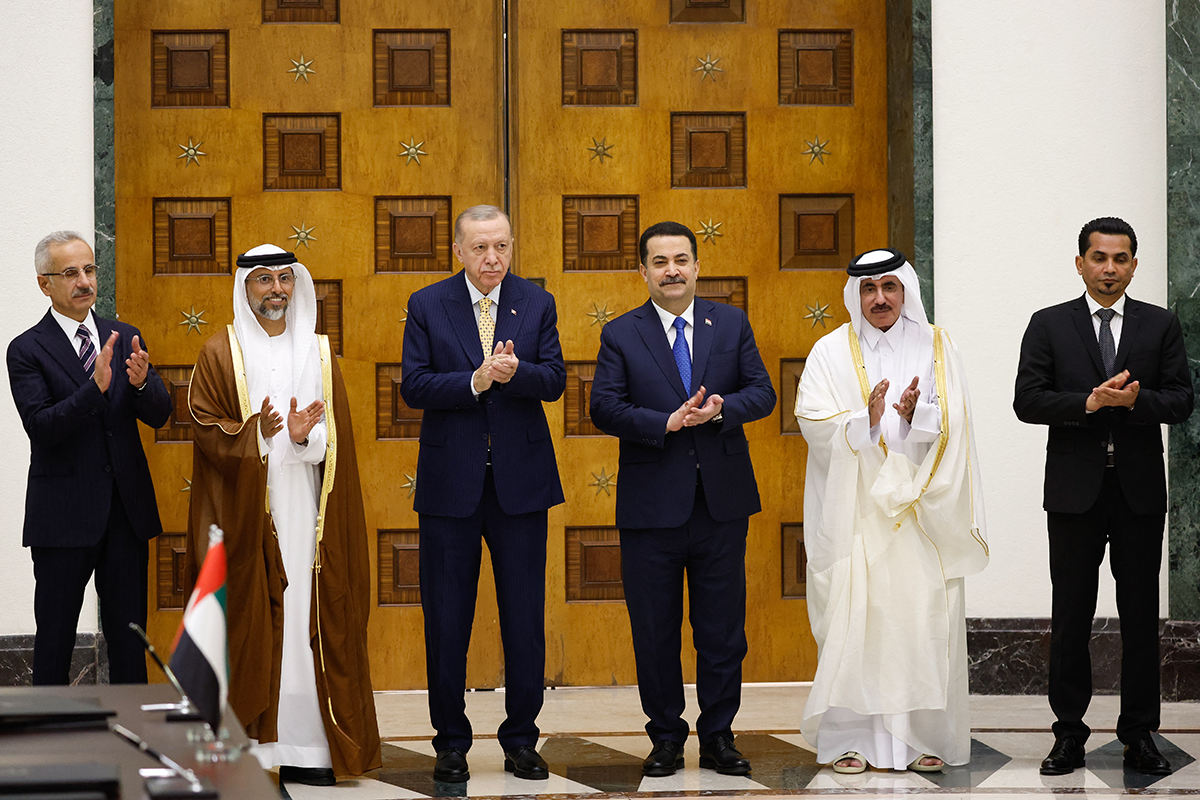
The Middle East and Normalization
Starting in September 2020, the Middle East began to normalize beyond Turkey's control, shaped by factors including the signing of the Abraham Accords between Israel, the UAE, and Bahrain; the resolution of the intra-Gulf dispute; the restoration of diplomatic ties between Iran and Saudi Arabia; and the gradual reintegration of Syria into the regional system. Turkey’s foreign policy followed suit.
Following the 2013 coup d'état in Cairo, Turkey downgraded its diplomatic relations with Egypt and recalled its ambassador. Efforts to normalize relations between the two countries began in 2022 when President Erdoğan and Egyptian President Abdel-Fattah el-Sisi met. Normalization efforts continued in the post-election period. On July 4, 2023, with the Turkey-Egypt Joint Statement, Ankara and Cairo decided to raise their diplomatic relations to the ambassadorial level. Turkish Foreign Minister Hakan Fidan paid a visit to Egypt on Oct. 13-14, 2023, during which the two countries announced their mutual interest in defense and trade cooperation.18
As a result of heightened competition for regional hegemony after 2011 and Turkey’s close relations with Qatar and the Muslim Brotherhood, Ankara’s ties with Riyadh and Abu Dhabi became strained. The murder of Saudi journalist Jamal Khashoggi further increased tensions between Turkey and Saudi Arabia after 2018. Softening with both countries had already begun in 2022 but increased significantly in the post-election period. During President Erdoğan's visit to Saudi Arabia on July 17, 2023, 18 investment and cooperation agreements were signed between the two countries, covering sectors as varied as agriculture, industry, defense, health, renewable energy, and the space industry. The UAE, too, has rapidly progressed in normalizing relations with Turkey, and important steps were taken with President Erdoğan's visit to the UAE and President Mohamed bin Zayed Al Nahyan's visit to Turkey.19
Despite efforts to normalize relations with Syrian President Bashar al-Assad, Turkey's Syria policy continued to follow a complicated course. Initially, ministerial meetings with Turkey, followed by participation in Arab League and Organization of Islamic Cooperation meetings, marked the beginning of a clear process of diplomatic reacceptance of Damascus.20 Turkey's military presence in Syria remained a major point of tension in its relations with that country as well as with Iran, Russia, and the United States. Iran continued to voice its objections to Turkey's military presence in Syria in 2023, urging Ankara to withdraw its troops in exchange for assurances that the Damascus administration would not pose a threat to Turkish territory.21 The transborder dimension of the Kurdish question and the issue of the (voluntary) return of Syrian refugees have brought Syria back into the spotlight as an important part of the Turkish domestic political agenda. In short, while engagement with the Assad regime in 2024 is on the table, the Syrian issue still poses a challenge for Turkish foreign policy.
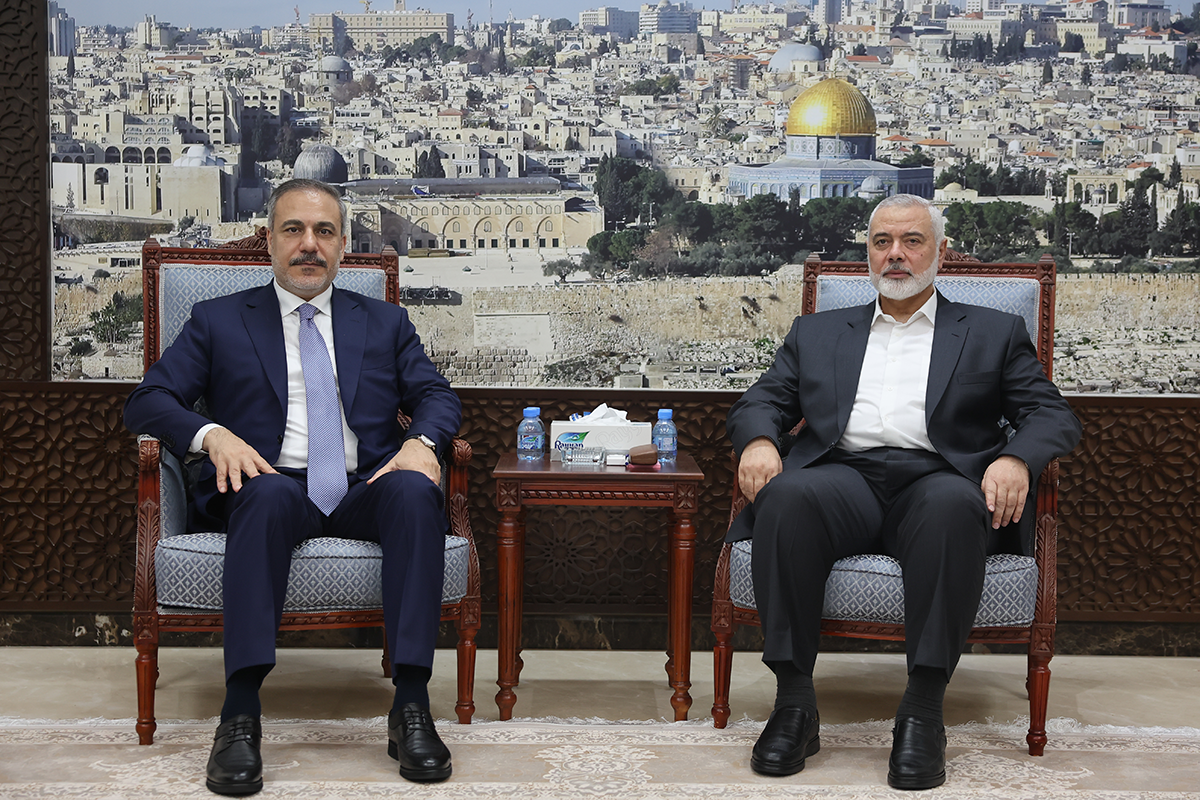
The Gaza War
The systemic changes supporting regional normalization efforts after 2021 were significantly altered by the Hamas attack against Israel on Oct. 7, 2023 and Israel's subsequent offensive in Gaza. Turkey's diplomatic relations with Israel were strained by the "one-minute" incident at Davos in 2009 between Erdoğan and Israeli President Shimon Peres as well as the Israeli operation against the Mavi Marmara aid flotilla to Gaza a year later. After 12 years of frosty relations, diplomatic ties were re-established in 2022 when both Turkey and Israel appointed ambassadors, and the Israeli president and defense minister visited Turkey. However, even during this period, Ankara's ties with Hamas remained a security concern for Tel Aviv, which criticized Turkey for hosting terrorists. Notably, Turkey gave Turkish passports to and hosted Hamas leaders, and asked them to leave only after the Oct. 7 attack, citing security concerns for their well-being.
The conflict in Gaza has underscored the challenges facing Turkey's reconciliation efforts with Israel. Ankara's current strategy is inspired by multiple factors: Firstly, the AKP leadership's unwavering support for the Palestinian cause and its ideological affinity with Hamas. Secondly, efforts at rapprochement aimed at alleviating Turkey's isolation and bolstering its economy necessitate maintaining ties within the Western alliance, while also avoiding alienating Israel and Arab states in the region. Thirdly, Ankara continues to harbor hegemonic aspirations, which are evident through its adoption of instruments such as mediation.22 Lastly, domestic political developments also significantly influence its rhetoric and strategy.
From the outset of the conflict, Turkey maintained diplomatic and commercial ties with Israel while taking a critical stance in its discourse, condemning Israel, characterizing certain groups as freedom fighters, and criticizing the West for its perceived double standards. This stance hardened as the conflict progressed. The recent local elections on March 31 hold significant importance in this context, as the ruling AKP lost a considerable portion of its conservative and Islamist vote to the far-right New Welfare Party (YRP). Central to the YRP’s critique of the AKP during the campaign was the perception that the government’s policies toward Israel were merely symbolic and lacked substance. Specifically, the YRP criticized Turkey’s ongoing trade with Israel and identified the issue as a barrier to a potential electoral coalition with the AKP. Immediately after the elections, the Ministry of Trade announced restrictions on trade with Israel in 54 key goods, and it subsequently expanded the restrictions to cover all imports and exports in early May.
Regarding its hegemonic aspirations and the instrumentalization of its links with Hamas, Ankara has consistently expressed a willingness to mediate the Gaza conflict. In its initial stages, Foreign Minister Hakan Fidan proposed a "guarantor formula" within the framework of a two-state solution based on the 1967 borders. Turkey's call for an increased role in conflict resolution did not receive support from Israel, the US, or other countries in the region. Instead, Qatar and Egypt played a mediating role in the ceasefire and hostage exchange, with the former using its close contacts with Hamas.23
As Qatar's mediation efforts reached their limits, Ankara has attempted to leverage its existing connections to the relevant parties to create an opportunity that would enable it to reclaim the sought-after role of regional power by insisting on being a mediator to the conflict. On April 20, President Erdoğan and Foreign Minister Fidan met in Istanbul with Ismail Haniyeh, the head of the political bureau of Hamas. This meeting followed remarks from Erdoğan likening Hamas fighters to the Turkish resistance forces of the 1920s. After subsequent discussions, Ankara affirmed that Hamas would be willing to dissolve its military wing if a Palestinian state were established within the 1967 borders. This initiative aimed to reshape Hamas' image, positioning both Turkey and the organization to be potentially involved in the resolution of the Israeli-Palestinian conflict.
Normalization as Consolidation of Transactionalism
As in previous years, Turkey’s foreign policy in the post-election period was shaped by the changing dynamics of regional politics, as Ankara sought to balance its economic challenges with domestic calculations and regional aspirations. Continuing the pre-election normalization trends, Ankara has worked to normalize its relations with both Western allies and regional actors, somewhat at the expense of its ties with Russia.
The normalization trend observed in Turkey's bilateral relations is not only about the re-establishment of diplomatic ties, but also the consolidation of transactionalism. Authoritarian rulers, long criticized for their disregard for human rights, are now being incorporated into the system under the guise of normalization. Changes in behavior regarding the rule of law and good governance remain significant factors in Turkey’s relations with the West, particularly in shaping the success of its macro-economic stabilization program. However, their importance in directly influencing foreign policy has been substantially reduced.
This was the trend prior to the March 2024 local elections. Yet once again, Turkey's political landscape shifted as a result of these elections, with a renewed focus on democratization as President Erdoğan and the AKP faced their biggest electoral defeat in over two decades. While this defeat might not directly signal a shift in Ankara's foreign policy, it undoubtedly challenges the claims to legitimacy of Erdoğan's government, thereby constraining its domestic and foreign policy options. Whether this signifies a disruption in the consolidation of transactionalism or prompts Western allies to find ways to engage with the opposition (and democracy) remains to be seen.
Evren Balta is a Professor of Political Science at Özyeğin University in Istanbul, Turkey, and a non-resident scholar with MEI’s Turkey Program. Her research has explored the intersection of comparative and international politics, internal conflicts and democratic backsliding in Russia and Turkey, Turkish foreign policy, civil-military relations, and how transnational inequalities reshape citizenship regimes.
Photo by TUR Presidency/Murat Cetinmuhurdar/Anadolu Agency via Getty Images.
1 John de Bhal, "Rethinking ‘middle powers’ as a category of practice: stratification, ambiguity, and power," International Theory 15, no. 3 (2023): 404-27, https://doi.org/10.1017/S1752971923000118.
2 Meliha Benli Altunışık, "The trajectory of a modified middle power: an attempt to make sense of Turkey’s foreign policy in its centennial," Turkish Studies 24, no. 3-4 (2022): 658-72, https://doi.org/10.1080/14683849.2022.2141624.
3 Gönül Tol, Erdoğan’s War: A Strongman's Struggle at Home and in Syria (Oxford: OUP, 2023).
4 Mustafa Kutlay and Ziya Öniş, "Turkish foreign policy in a post-western order: strategic autonomy or new forms of dependence?," International Affairs 97, no. 4 (2021): 1085-1104, https://doi.org/10.1093/ia/iiab094.
5 Evren Balta and Soli Ozel, “Un moment fondateur pour l’ordre du monde,” in Guerre en Ukraine et nouvel ordre du monde (Paris: Éditions de l'Observatoire, February 2023).
6 Evren Balta, Seda Demiralp, and Selva Demiralp, "Debating voter defection in Turkey," Turkish Studies 24, no. 5 (2023): 739-63, https://doi.org/10.1080/14683849.2023.2200941.
7 Seda Demiralp and Evren Balta, "Defeating Populists: The Case of 2019 Istanbul Elections," South European Society and Politics 26, no. 1 (2021): 1-26, https://doi.org/10.1080/13608746.2021.1923639.
8 Galip Dalay, “How will geopolitics shape Turkey’s international future?,” Chatham House, June 5, 2023, https://www.chathamhouse.org/2023/06/how-will-geopolitics-shape-turkeys-international-future.
9 “Turkey’s Erdogan arrives in Saudi Arabia to kick off Gulf tour,” Al Jazeera, July 17, 2023, https://www.aljazeera.com/news/2023/7/17/turkeys-erdogan-arrives-in-saudi-arabia-to-kick-off-gulf-tour.
10 Onur İşçi and Samuel Hirst, “Turkey’s Elections and Foreign Policy Options,” War on the Rocks, May 1, 2023, https://warontherocks.com/2023/05/turkeys-elections-and-foreign-policy-options/.
11 Nilgün Arınsan Eralp, “Are the Recent European Council Decisions on Türkiye Hypocritical?,” TEPAV Publications, April 2024, https://www.tepav.org.tr/upload/mce/2024/notlar/are_the_recent_european_council_decisions_on_turkiye_hypocritical.pdf.
12 Republic of Türkiye Ministry of Foreign Affairs, “No: 63, 18 April 2024, Regarding the Conclusions of the Extraordinary European Council of 17-18 April 2024,” press release, https://www.mfa.gov.tr/no_-63_-17-18-nisan-2024-tarihli-ab-devlet-ve-hukumet-baskanlari-ozel-zirvesi-sonuclari-hk.en.mfa.
13 Matthew Lee, “US approves F-16 fighter jet sale to Turkey, F-35s to Greece after Turkey OKs Sweden’s entry to NATO,” AP News, January 26, 2024, https://apnews.com/article/us-turkey-sweden-nato-ukraine-russia-02418dd7644bc8865fdafdff4c848dbd.
14 “Türkiye ile Irak arasında 26 anlaşma imzalandı,” Bloomberg HT, April 22, 2024, https://www.bloomberght.com/turkiye-ile-irak-arasinda-26-anlasma-imzalandi-2351450.
15 Barçın Yinanç, “Vaşington ziyareti neden ertelendi-iptal edildi?,” T24, April 28, 2024, https://t24.com.tr/yazarlar/barcin-yinanc/vasington-ziyareti-neden-ertelendi-iptal-edildi,44573.
16 Gökhan Yıldız, “Türkiye-Rusya ticaret hacmi 2023'te de 65 milyar doları aşacak,” Anadolu Agency, November 23, 2023, https://www.aa.com.tr/tr/ekonomi/turkiye-rusya-ticaret-hacmi-2023te-de-65-milyar-dolari-asacak/3062366.
17 “Soaring Turkish Exports of Military-Linked Goods to Russia Raise Western Concerns - FT,” The Moscow Times, November 27, 2023, https://www.themoscowtimes.com/2023/11/27/soaring-turkish-exports-of-military-linked-goods-to-russia-raise-western-concerns-ft-a83224.
18 Republic of Türkiye Ministry of Trade, “Türkiye ve Mısır Ticaret Hacminin 15 Milyar Dolara Çıkarılması Hedeflenmektedir,” August 1, 2023, https://ticaret.gov.tr/haberler/turkiye-ve-misir-ticaret-hacminin-15-mi….
19 “Türkiye'nin Suudi Arabistan ve BAE hamlesi sonuç verdi: Tam 11 milyar dolar,” Yirmidort TV, January 11, 2024, https://www.yirmidort.tv/ekonomi/lider-diplomasisi-turkiyenin-suudi-arabistan-ve-baeye-ihracatina-da-yansidi-147073.
20 Serhat Erkmen, “2024’te Suriye’yi ne bekliyor: Göç, çatışma, diplomasi,” Fikir Turu, January 8, 2024, https://fikirturu.com/jeo-strateji/2024te-suriyeyi-ne-bekliyor-goc-catisma.
21 “İran'dan Türkiye'ye: Suriye'deki askerleri bizim garantörlüğümüzde çekin,” Euronews, September 18, 2023, https://tr.euronews.com/2023/09/18/irandan-turkiyeye-suriyedeki-askerleri-bizim-garantorlugumuzde-cekin.
22 Sinem Adar, “Turkey’s Response to the War in Gaza,” War on the Rocks, November 1, 2023, https://warontherocks.com/2023/11/turkeys-response-to-the-war-in-gaza/.
23 Feyza Gümüşlüoğlu, “Katar İsrail-Hamas Arasında Nasıl ‘Arabulucu’ Oldu?,” Perspektif Online, December 6, 2023, https://www.perspektif.online/katar-israil-hamas-arasinda-nasil-arabulucu-oldu/.
The Middle East Institute (MEI) is an independent, non-partisan, non-for-profit, educational organization. It does not engage in advocacy and its scholars’ opinions are their own. MEI welcomes financial donations, but retains sole editorial control over its work and its publications reflect only the authors’ views. For a listing of MEI donors, please click here.













